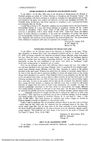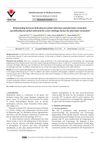 16 citations,
August 1967 in “JAMA”
16 citations,
August 1967 in “JAMA” Oral contraceptives may cause hair loss in women.
 1 citations,
May 2016 in “Current Opinion in Pediatrics”
1 citations,
May 2016 in “Current Opinion in Pediatrics” Children's hair loss can be caused by various factors and should be treated with appropriate, age-specific methods and psychological support.
 January 2016 in “Springer eBooks”
January 2016 in “Springer eBooks” The document concludes that there are various causes and treatments for hair loss, with hair transplantation being a notable option.
 14 citations,
April 2017 in “American Journal of Transplantation”
14 citations,
April 2017 in “American Journal of Transplantation” Skin problems from transplant drugs are common and need careful management in organ transplant patients.
 6 citations,
January 2012 in “Springer eBooks”
6 citations,
January 2012 in “Springer eBooks” Trichoscopy is not specific for diagnosing telogen effluvium and both telogen effluvium and androgenetic alopecia often occur together.
 January 2011 in “Medicina interna de México”
January 2011 in “Medicina interna de México” The document concludes that treating the underlying causes of telogen effluvium usually results in hair regrowth.
 48 citations,
September 2009 in “Dermato-endocrinology”
48 citations,
September 2009 in “Dermato-endocrinology” Anorexia nervosa can cause skin problems, which may help with early diagnosis and usually improve with treatment.
 September 2024 in “Journal of Bioscience and Applied Research/Journal of Bioscience and Applied Research ”
September 2024 in “Journal of Bioscience and Applied Research/Journal of Bioscience and Applied Research ” COVID-19 can cause hair loss due to stress, with inflammation markers like D-dimer levels playing a role.
 125 citations,
September 2001 in “The FASEB Journal”
125 citations,
September 2001 in “The FASEB Journal” Stress can cause hair loss by negatively affecting hair follicles and this effect might be reversed with specific treatments.

Stopping Seroxat (paroxetine) treatment ended hair loss in a woman.
 December 1990 in “PubMed”
December 1990 in “PubMed” Some drugs can cause hair loss, increase hair growth, or change hair color, but stopping the drug usually reverses these effects.
 2 citations,
November 1990 in “International Journal of Dermatology”
2 citations,
November 1990 in “International Journal of Dermatology” Albendazole can cause hair loss, and piroxicam can cause fixed drug eruption.
 1 citations,
July 1976 in “Archives of Dermatology”
1 citations,
July 1976 in “Archives of Dermatology” Some women experienced hair loss after stopping chorionic gonadotropin injections and a low-calorie diet.
 33 citations,
September 1961 in “Archives of Dermatology”
33 citations,
September 1961 in “Archives of Dermatology” Colchicine causes rapid hair loss by damaging hair follicles.
 5 citations,
December 2019 in “JAAD Case Reports”
5 citations,
December 2019 in “JAAD Case Reports” A woman experienced rapid hair loss after taking albendazole, but it started to improve when she stopped the medication.
 2 citations,
January 2022 in “Clinical, Cosmetic and Investigational Dermatology”
2 citations,
January 2022 in “Clinical, Cosmetic and Investigational Dermatology” The refined wash test is a reliable way to measure daily hair loss and can tell the difference between different types of hair loss.
 4 citations,
May 1999 in “PubMed”
4 citations,
May 1999 in “PubMed” Some medications can cause reversible hair loss by affecting hair growth cycles.

Oral minoxidil effectively treats hair loss, with women needing lower doses (0.25 to 2.5 mg daily) and men needing higher doses (1.25 to 5 mg daily).
 6 citations,
December 2019 in “BMC Complementary and Alternative Medicine”
6 citations,
December 2019 in “BMC Complementary and Alternative Medicine” Alcohol extract from Vernonia anthelmintica seeds may help treat stress-related hair loss.
 2 citations,
March 2015 in “Clinical and Experimental Dermatology”
2 citations,
March 2015 in “Clinical and Experimental Dermatology” Azathioprine can cause unusual hair loss, which may reverse after stopping the drug.
 2 citations,
April 2017 in “Asian Journal of Psychiatry”
2 citations,
April 2017 in “Asian Journal of Psychiatry” Valproic acid can cause hair loss when taken orally but may promote hair growth when applied topically.
 8 citations,
April 2013 in “Journal of The American Academy of Dermatology”
8 citations,
April 2013 in “Journal of The American Academy of Dermatology” Some breast cancer patients treated with high-dose docetaxel may experience permanent hair loss.
 10 citations,
January 2008 in “Acta dermato-venereologica”
10 citations,
January 2008 in “Acta dermato-venereologica” Carbamazepine caused hair loss and skin eruptions in a woman, which improved after stopping the medication.
 2 citations,
February 2023 in “Vaccines”
2 citations,
February 2023 in “Vaccines” Some people experienced hair loss after COVID-19 vaccination, but it's very rare and vaccines' benefits are greater than this risk.
 November 2022 in “Skin health and disease”
November 2022 in “Skin health and disease” People with hair loss conditions often have more mental health issues like depression and anxiety compared to those without hair loss.
 25 citations,
July 2021 in “Journal of Medical Virology”
25 citations,
July 2021 in “Journal of Medical Virology” COVID-19 can cause various skin issues, including rashes and hair loss, which usually heal on their own and don't always indicate severe illness.
 17 citations,
January 2020 in “Skin appendage disorders”
17 citations,
January 2020 in “Skin appendage disorders” Certain diets may help with hair growth in people with different types of hair loss.
 8 citations,
May 2020 in “Anais Brasileiros de Dermatologia”
8 citations,
May 2020 in “Anais Brasileiros de Dermatologia” Higher levels of ischemia-modified albumin in telogen effluvium patients may indicate oxidative stress.
 4 citations,
March 2020 in “Turkish Journal of Medical Sciences”
4 citations,
March 2020 in “Turkish Journal of Medical Sciences” There may be a link between Helicobacter pylori infection and the skin condition pityriasis versicolor.
 32 citations,
December 2017 in “International Journal of Molecular Sciences”
32 citations,
December 2017 in “International Journal of Molecular Sciences” Low vitamin D might be linked to certain types of hair loss, and supplements could help, but more research is needed.






























